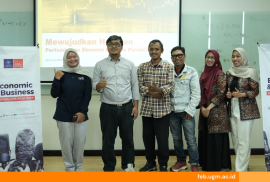FEB UGM is not just taking progressive steps, but leading the way in preparing future leaders in economics and business. Our aim is to develop sustainable aspects and equip these leaders to confidently face the challenges of global dynamics.
“FEB UGM’s new mission to develop future-ready leaders and promote sustainability in academic and student affairs is already making a significant impact in five key areas,” shared FEB UGM Vice Dean for Academic and Student Affairs, Bayu Sutikno, S.E., M.S.M., Ph.D., on Tuesday (14/5).
First, FEB UGM is actively broadening access to all communities, including those with economic, social, and geographical vulnerability (3T), to pursue their studies at FEB UGM. This policy underscores the Faculty’s unwavering commitment to fostering quality, dignified, tolerant, inclusive, and sustainable education.
“We provide broad opportunities for the nation’s best sons and daughters, including those from underdeveloped, frontier and outermost areas (3T) to study at FEB UGM. So the efforts made by FEB UGM to develop future leaders do not necessarily mean being exclusive but open or inclusive to all levels of society,” stressed Bayu.
Second, curriculum development at the FEB UGM is guided by sustainability principles. This curriculum development can be seen in the development of various courses such as Business Ethics and Sustainability, a new concentration on Sustainability Management in the Master in Management program, Sustainable Accounting courses in the Master of Science and Doctoral programs, Green Economy in the Master in Development Economics program, and the ASEAN Master in Sustainable Program Management.
“Including sustainability issues in the curriculum is an important step in preparing students as future leaders responsible for the sustainability of the social and natural environment,” he said.
He added that to prepare future leaders, FEB UGM is also introducing aspects of artificial intelligence (AI) and technology and information systems into the curriculum of undergraduate programs. This has been implemented in the Accounting program, which adds material related to technology and information systems. Students must take seven courses or the equivalent of 21 Semester Credits (SKS).
Third, FEB UGM also promotes innovative learning processes by providing online learning resources, including databases such as Bloomberg, Osiris, and CEIC. Apart from this, FEB UGM also seeks to minimize the generation of plastic waste in learning activities, including the consumption of bottled drinking water through the culture of using personal drinking water bottles/tumblers and providing free refills of drinking water through water fountains from the Drinking Water Supply System (SPAM) UGM. This policy is intended to create an environmentally friendly learning environment.
Fourth, FEB UGM focuses on improving student achievement and facilitating activities with a sustainable perspective within student organizations. This support and facilitation can encourage students to achieve. Some of them are the success of FEB UGM students who participated in the Harvard Project College for Asian and International Relations (HPAIR) Harvard Conference 2024, held in Cambridge, Boston, in February 2024. They won third place and the top team in the international business competition. The ICAEW China & South-East Asia Business Challenge was held in Jakarta on May 11, 2024.
Lastly, FEB UGM seeks to develop graduates ready to become future leaders with sustainability insight. The effort is done by providing the tools and career preparation for sustainability-minded students.
“Through these various comprehensive approaches, it is hoped that FEB UGM can contribute to producing quality and sustainable future leaders,” he concluded.
Reportage: Kurnia Ekaptiningrum
Sustainable Development Goals










